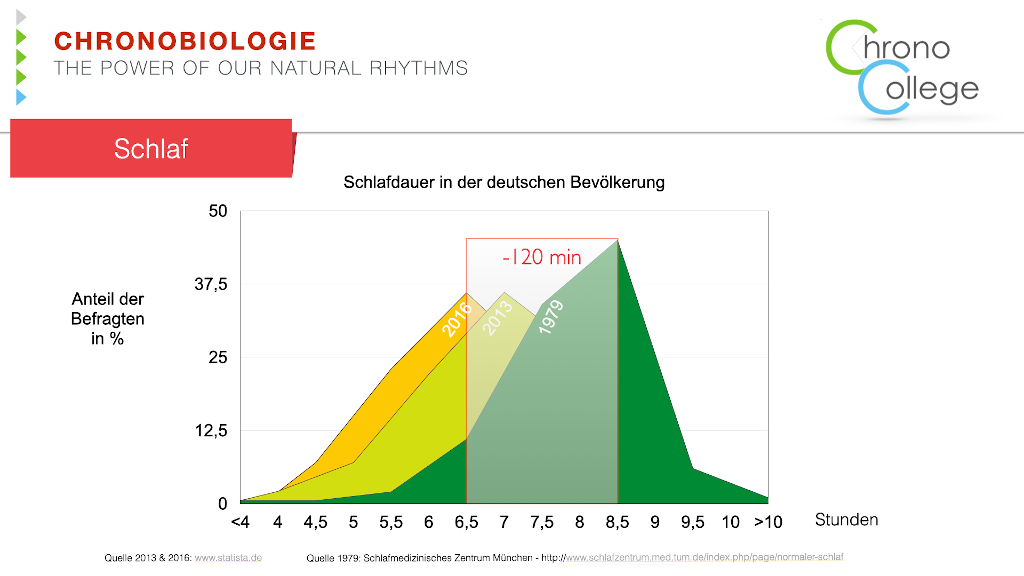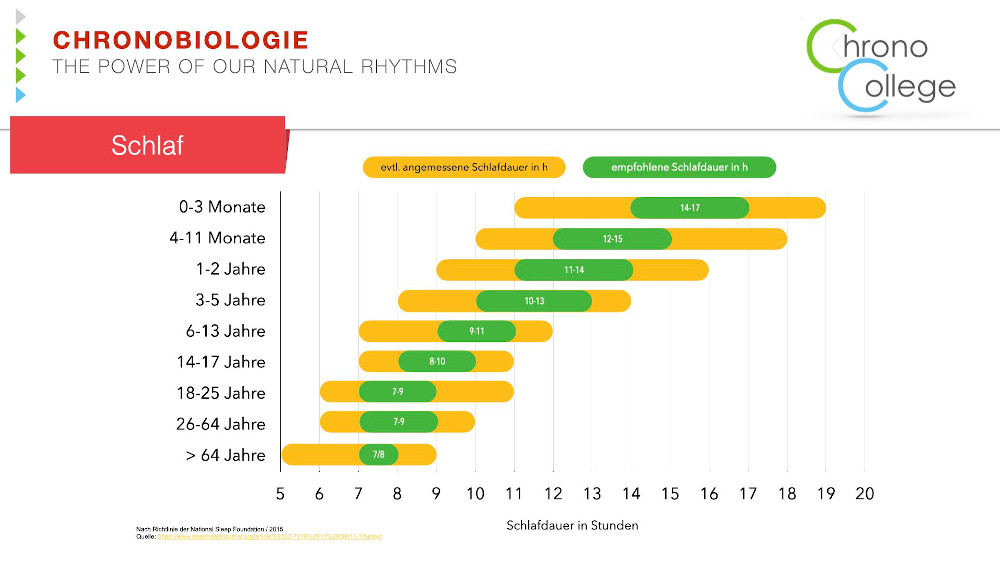Sleep duration – how much sleep do we need?
The RNA BodyClock Chronotype Hair Root Test can now be used to determine when our biological sleep times are. However, in the same breath I am often asked whether it is possible to determine individual sleep requirements. My answer:
Jain
There is definitely no test method comparable to the RNA test mentioned above. In principle, however, it is possible using the self-test method. To do this, however, I must be able/want to fall asleep as a healthy person for at least 14 days when I am tired so that I can wake up without an external stimulus. Only then do I have the chance to fall into my natural sleep/wake rhythm, unless I am actually already doing this in my everyday life.
However, only very few have/use this option. Even on vacation, it is more important for many people to be the first at the buffet or to throw their towel over the lounger by the pool early in the morning. As a result, sleep duration is repeatedly the subject of studies to determine the optimum sleep duration.
Scientists from the Institute of Science and Technology for Brain-Inspired Intelligence, Fudan University, Shanghai, China, have examined data from almost 500,000 adults aged between 38 and 73 years collected in the British database “UK Biobank” in a study. The test subjects were asked about their mental health and their sleeping habits. They also took part in a series of cognitive tests. Genetic data and MRI images of the brain were available for around 10 percent of the test subjects.
I don’t want to go into this study in detail now. I have attached the complete abstract in German at the end of this article.
However, the core message is: 7 hours of sleep is enough!
Sleep duration – normal and not normal
In my eyes, this is a paradox of science. On the one hand, we are increasingly trying to promote individual medicine; on the other hand, we are constantly creating new areas that define a “normal” and thus, conversely, classify everything else as “not normal”. In my opinion, this study creates a dangerous new “normal” when it comes to sleep. The phrase “7 hours of sleep is enough” can quickly become the baseline for all areas of our lives, especially working hours, to the detriment of all those for whom 7 hours is not enough – and that tends to be the majority.
Sleep requirement, actual sleep duration and sleep recommendation
First of all, it is important to understand the difference between sleep requirements and sleep duration:
Sleep requirement: This describes the time the body needs to fully regenerate mentally and physically. In addition to the natural need for sleep, there is also the need that has built up due to additional sleep pressure. There are a number of things that influence the development of additional sleep pressure. This can be due to too little sleep on the previous days, illness, increased mental stress, but also genetic predisposition.
For me, the most important aspect is that a healthy body usually stops sleeping of its own accord when the regeneration process has been completed. This is of course very simplified, but in principle this is the natural process for every living being.
Sleep duration: This describes the actual time slept, completely independent of physical processes. The duration of sleep is influenced by many “limiters”, such as alarm clocks, noise, children, partners, psychological triggers that end in sleep disorders. Strictly speaking, difficulty falling asleep is not one of these limiters per se, as it does not potentially prevent you from “sleeping in”. However, you can also shorten the period if the wake-up time is scheduled.
Sleep recommendation: Any limiting sleep recommendation, and this is my concern, is now placed across the board above the natural need for sleep and thus acts as an artificial limiter. In addition, people who have a naturally lower/higher need for sleep are led to believe that their bodies are not acting naturally in some way.
The consequence: A recommendation made does not, of course, express verbis imply right or wrong, but has the character of a definition. And so it can/will quickly become a benchmark in a society trimmed for productivity.
7h vs. 8h

As recently as 1979, a survey by the Sleep Medicine Institute in Munich revealed an average sleep duration of 8.5 hours on working days among the German population. This means that most people actually slept in back then. In 2013, another survey found only 7 hours, and in 2017 only 6.5 hours. If you look at the development of psychosomatic illnesses, depression and burnout over the same period, this does not fit with the assumption that 7 hours of sleep is enough.
Incidentally, BodyClock also uses the previous standard of 8 hours of average sleep requirement in its scientific determination of chronotype.
Too little sleep / too much sleep
What is too much or too little sleep? In principle, this applies to both:
Anything that damages the natural regeneration process
Too little sleep is easy to define. As a rule, it is a limiter (e.g. working hours/alarm clock) that ensures that sleep cannot complete its work. It’s like in the workshop. If the mechanic stops after 2/3 of the work, the car has not yet been repaired.
But what is too much sleep? And that’s where we run into a definitional problem. As already indicated, sleep would have to have damaging effects in order to sleep “too much”. However, it is precisely at this point that the question arises as to whether “too much sleep” is a symptom of damage or actually the cause of damage. In other words, do we sleep too long because long-term physical exertion requires a longer regeneration process, or do we sleep longer than we should as healthy people without any need for regeneration?
I know of no study that clearly differentiates here, not even this one, which can also be read from the following formulation:
“While we cannot definitively say that too little or too much sleep causes cognitive problems, our analysis looking at people over a longer period of time seems to support this idea. “Study citation (translated)
So one question that remains unanswered is: how can we sleep too long without the need for regeneration?
Alternatively, there is only the possibility that the body actually sleeps longer because it has a high physical or rather psychological regeneration pressure, but “overdoes it”, so to speak. There are many occasions when the body needs to regenerate over a long period of time, just like a car that cannot be repaired in one day. One possibility is that the impulse to wake up or reduce the melatonin level is absent, too weak or comes too late. There can be several causes here, such as problems with morning cortisol production(CAR – Cortisol Awakening Response). But no matter how we spin it, the cause of the damage caused by too much sleep would still not be the sleep itself, but the corresponding reason for the missing or disturbed impulse.
Recommendation National Sleep Foundation
In 2015, the National Sleep Foundation published a recommendation paper on sleep duration. It convened an 18-member multidisciplinary expert panel representing 12 stakeholder groups to evaluate scientific literature on recommendations for sleep duration. They determined expert recommendations for adequate sleep durations across the lifespan using the RAND/UCLA adequacy method. Result here: For the age group between 18 and 64, the recommendation is 7-9h. The important difference. Various aspects were included in this overview and a range was determined within which one should move in terms of sleep. Even up to 10 hours of sleep were rated as “appropriate” here. It is important to understand here that “possibly. appropriate” does not mean “recommended”. It means that for some people, depending on their genetic predisposition, it may still be sufficient or not too much (!). In the “possibly. appropriate”, each person should be looked at individually.

Conclusion:
To my knowledge, there is no evidence to date that sleep itself is the primary cause of damage, provided it follows its natural process. If it cannot follow its natural process, then this is due to a corresponding malfunction. However, this would then be the actual cause of the damage, and sleeping too long would only be the consequence. To compare it with the car again:
A critically injured person has only 10 minutes to get to hospital. However, the ambulance gets stuck in a traffic jam and therefore only arrives after 12 minutes. So it was not the excessively long transportation that caused his death, but the traffic jam.
Grass doesn’t grow faster if you pull on it!
Every body needs its own time to regenerate. This is a combination of genetic predisposition and sleep pressure. And just because a study now recommends less sleep does not mean that all bodies will follow this recommendation of their own accord and make the evolutionary leap to master the process that previously took 8 hours in 7 hours.
I would therefore tend to convert this recommendation into a “minimum requirement”. Then it becomes a shoe.
However, anyone who claims that 7 hours of sleep is sufficient should be aware of what they are setting off.
Abtract Translated:
Sleep duration, mental disorders and dementia are closely linked in older adults. However, the underlying genetic mechanisms and structural changes in the brain are unknown. Using data from the UK Biobank for participants of mainly European ancestry aged 38-73 years, 94% of whom were white, we identified a nonlinear association between sleep, with around 7 hours as optimal sleep duration, and genetic and cognitive factors, brain structure, and mental health as key measures. The brain regions that most clearly underlie this connection included the precentral cortex, the lateral orbitofrontal cortex and the hippocampus. Longitudinal analyses showed that both insufficient and excessive sleep duration were significantly associated with a decline in cognition at follow-up. In addition, mediation analysis and structural equation modeling identified a unified model encompassing polygenic risk score (PRS), sleep, brain structure, cognition, and mental health. This suggests that possible genetic mechanisms and structural changes in the brain may underlie the non-linear relationship between sleep duration and cognition and mental health.
